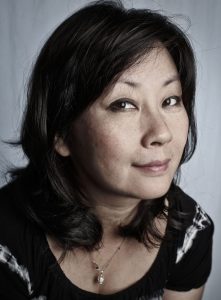 Photojournalist Yunghi Kim has covered conflicts and in-depth, issue-driven stories all over the world for more than three decades. Kim, a native of South Korea, graduated from Boston University in 1984 and began her career as a photographer at The Patriot Ledger in Quincy, Mass.
Photojournalist Yunghi Kim has covered conflicts and in-depth, issue-driven stories all over the world for more than three decades. Kim, a native of South Korea, graduated from Boston University in 1984 and began her career as a photographer at The Patriot Ledger in Quincy, Mass.
As a staff photographer at The Boston Globe, she was a finalist for the 1992 Pulitzer Prize for her coverage of the famine in Somalia. Kim remains proudest of her documentation of the lives of former South Korean Comfort Women. These women, affectionately called grandmothers, were forced into sexual slavery by the Japanese army during its occupation of Korea during World War II.
She recently spoke with Xinyi Song, a student at the University of Mississippi’s Meek School of Journalism & New Media, about her work.
Q: How did you find your passion and interest in photography?
A: I got interested in photography in high school and then in college, I worked for the school newspaper as a journalist. Then I think I got into photography was also because I couldn’t speak English well when I came here at 10 years old. So I struggled with the language. The visual communication can make me feel more natural and gave me a lot of confidence.
Q: As the first female photographer hired in the photography department at the Patriot Ledger, did you meet some difficulties or challenge during that time?
A: No, not really. Early in the field, there might be some comments and stuff, but not really in the department.
Q: I found you have a lot of black and white photos. Why you prefer this type?
A: I think I do black and white photos because I started my career in black and white. When I started my career, newspapers still used black and white. So when I do my project, I prefer using black and white. Just feel more comfortable. Even though now it’s digital photo, I still do black and white.
Q: What made you decide to go to Somalia and Iraq as a female photographer?
A: Courage, which not only for females but also male photographers need it, too. It is harsh conditions. Sometimes it is not safe, but it is part of the job. I knew I got into it. Some of them are assignments, you just do it. It is the curiosity to do the story.
Q: How do your family think about your job?
A: My mom totally supports me. My mom was a single mother who raised three kids. She was an Asian mother, but in that way, she was not an Asian mother. I don’t come from a traditional Asian family. I know the value of soft and independence.
Q: What were the biggest difficulties when you did for the photos in Somalia and Iraq?
A: It is scary. But you don’t anticipate that you’re going to be in that situation. I thought I was gonna be dead, but afterward, I became stronger. I think it is dangerous to drive down on the highway because you are a crazy driver. So my philosophy is, are you going to live in a fearless (way) or do what your passion is? So again, you take calculated risks. So that is what I did. I think that is the truth for women in my generation. … we do calculate the risks. I covered gang shootings in 1980 when I started my career. I used to listen to the police radio and used to chase gun violence and fires. That’s dangerous, too. I mean, photojournalism is not a safe profession. But you have to know the best and you buy into it when you go into it. If you want to be like safe, photojournalism is not for you. You’ve been misunderstanding it. That is what I look at it.
Q: Is courage the most important quality for you?
A: No, curiosity. I think you have to be curious about the world, curious about the story, curious about events, curious about the places and streets. Photojournalists have a higher mission. If you don’t get that, then I don’t know. You went for the wrong reason. You also need courage. Courage comes candies.
Q: Compared to work in newspaper, how do you find the topic as a freelance photographer?
A: You have to have the ideas and sense of what journalistic stories are. You have to think as a journalist. Sometimes you can do a story that interests you like comfort women I shot. I did it for curiosity. I also think it is an important story as an American Korean. It interested me and that’s why I did it. I didn’t think like contacting with history at that time. Now I think about it. It connects with history.





